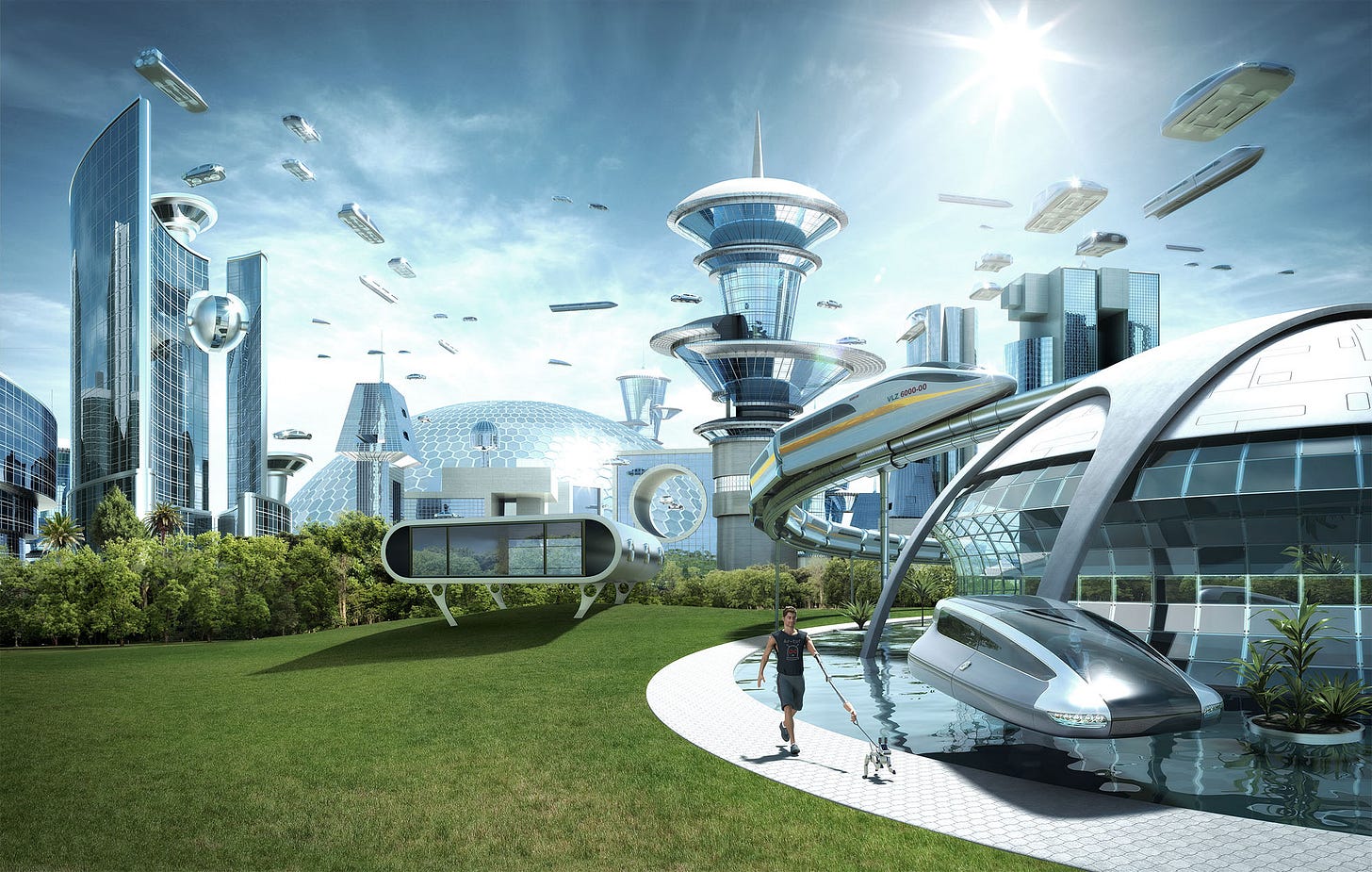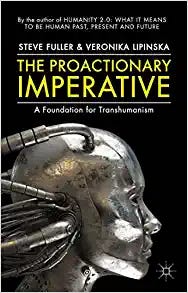I often write about the need for Up Wing thinking. Despite the political drama that unfolds on cable news and social media, the key divide in America is not Left versus Right but Up versus Down. Up Wingers are all about acceleration for solving big problems, effectively tackling new ones, and creating maximum opportunity for all Americans. Down Wingers, on the other hand, are soaked in nostalgia, scarcity, and risk minimization. In this episode, I'm joined by Steve Fuller to discuss the political implications of Up Wing and Down Wing thinking.
Steve holds the Auguste Comte Chair in Social Epistemology at the University of Warwick's Department of Sociology. He's the author of several books, including 2014's The Proactionary Imperative.
In This Episode
Up-Wing versus Down-Wing thinking (1:25)
America’s emerging Down-Wing coalition (9:45)
Towards an Up-Wing environmentalism (18:54)
Up-Wing politics and risk (25:31)
How Up Wingers should think of Elon Musk (31:30)
Below is an edited transcript of our conversation.
Up-Wing versus Down-Wing thinking
James Pethokoukis: In 1973, almost 50 years ago, the futurist F.M. Esfandiary wrote the book Up-Wingers: A Futurist Manifesto, where he posited a new political axis, where future-oriented Up Wingers and more traditionalist Down Wingers would replace the existing Left Wing-Right Wing axis. You've also framed this as Green — meaning traditional environmentalist — versus Black — the sky is the limit, perhaps space is the limit.
I wonder if you could just speak for a moment or two about the tenets of being Up Wing or on the Black pole versus Down Wing, Green pole. What does that look like in the modern political environment?
Steve Fuller: I think the first thing to say, given that you started with Esfandiary, who's known as FM-2030 to his fans in transhumanism, is that the book Up-Wingers actually only talked about Up Wingers but didn't talk about Down Wingers, because he was an incredibly optimistic guy, you might say. What he was really arguing in that book back in the ‘70s was that the Left-Right political axis would just be replaced by Up Wingers. There wouldn't be Down Wingers. That's an interesting aspect of what was going on back then in the ‘70s. And in fact, what he thought about as so-called “black sky thinking” — which is what you were alluding to in your question about Black being the kind of signal color for Up Wingers — he was actually talking about something rather close to the kind of internet that we have now, basically. Especially in terms of the personalized aspects of it: social media, the world-wide web, all of this kind of stuff. That was kind of what he was getting at. He wasn't really getting at some of the more profound things that I would say is now part of the political landscape in the contemporary world, which in a way makes the Up Winger or Down Winger distinction a much more visible distinction and much more salient than it was back 50 years ago.
Now, I think there is an Up Wing or Down Wing distinction in a very clear kind of way. I'm the one who kind of brings in the Down Wing aspect of this. And so as you said in your introductory remarks, at least in the European political spectrum, Red means Left and Blue means Right. Whereas I understand the United States these days, with the way the states get mapped, it's the other way around. But the point is, in any case, that color scheme is gone. And what we instead have is Black versus Green. The idea of Black for the Up Wingers is that the sky is the limit. You're imagining sort of the “black sky” kind of thing. That's the stellar cosmos color. Whereas the Down Wingers are Green in the sense that they basically want human beings to be planted on Earth. It's a very Earth orientation. It is a sky versus Earth thing in a way, Up Wing or Down Wing, in the way I'm talking about it.
The interesting thing about this distinction, as I think it plays out now, is that it shows a fundamental instability, you might say, in the concept of the human. Insofar as we've thought about social life and political life as revolving around humanity — how to organize humanity, what humanity is about, and so forth — we generally have had a kind of common understanding of what a human being is. And that's, roughly speaking, homo sapiens. Homo sapiens, in a way, provides a kind of outer limit to what we think about as a human. But now, with a lot of things going on — not just the stuff that has to do with information technology, where we can perhaps upload our consciousness or merge with machines in some way, even in some kind of Elon Musk-Neuralink fashion where we become cyborgs in a sense — it's not just that that's going on: There are all these potential biological transformations, biomedical transformations, which in a way could really destabilize even the biological nature of the human being. For example: human beings living indefinitely. All of that stuff would have incredible knock-on effects with regard to how we organize our social and political life, which to a large extent depends on the idea that human beings are more or less upright apes who live a finite period of time and then they succeed to another generation. Up Wingers are, in a sense, open to everything like this. It kind of explodes the category of the human, and that's why the term “transhumanism” is an appropriate term for those people, because they want to transcend the limits of the human.
The Down Wingers take the exact opposite view and think the Up Wingers are completely dangerous. The [Down] Wingers think that, if anything, the problems that we have now on Earth — let's say the climate issues, but also even maybe the pandemic issue and so forth — have to do with the extent to which humans have overextended themselves on the planet. They don't know their limits. And in some sense, what human beings need to do is not to think that we're somehow above animals and nature, but rather to return, as it were, to our natural origins. And that homo sapiens may not be so special after all, and that our survival may depend on our having a more modest understanding of what our nature is. The Down Wingers basically want to get us down there. That's why these people like to talk about the precautionary principle, for example, which is to say that when you introduce any innovations or whatever, you minimize risk. You do no harm. It's like a Hippocratic Oath for the Earth. This is a view that has a lot of prominence these days. This view is even called “post-humanist,” because, in a sense, it wants to minimize the significance of the human in order to return to something that is a more stable, Earthly existence. So this is where the polarities are: some want to go into the skies and some want to really implant themselves on the Earth.
In the book 50 years ago, Down Wing was not mentioned, yet it seems as though that view, broadly speaking — concerns about scarcity, about limits, thinking going to space would be a waste of money, also looking at technological stagnation over the past half century — it seems like even though Down Wing was not mentioned, Down Wing has been winning and has been the dominant ethos.
I think there's a certain truth to that. I think the Silicon Valley people are very attuned to this point. Peter Thiel, I suppose, would be the main one who talks about the great technological stagnation that's been taking place over the past 50 years. I think he's basically right, and probably for the kinds of reasons you've just cited: that there has been this kind of latent Down Winger tendency. But I think, in a way, it has converged in very interesting ways with other kinds of movements in recent years to make it stronger so that it becomes a kind of social justice movement. It is no longer just purely about ecologists, environmentalists in the narrow sense; but rather, it has this much broader sense, because if one thinks about who would be most vulnerable to any kind of climate catastrophe or something like that, then one starts to bring in the developing world, the poor, the people who are already kind of unprotected. This gets then rolled into a very large social justice agenda, which then makes the Down Wing movement much more powerful, you might say, than it would've appeared 50 years ago.
America’s emerging Down-Wing coalition
What led me to some of your writings was really the 2016 election here in the United States, when you had this weird phenomenon of people who supported Bernie Sanders, but when he did not win the Democratic nomination said, “Then maybe we'll support Donald Trump.” At first, that seems crazy. But if you start to look at things with an Up Wing versus Down Wing perspective, it begins to make a little bit of sense. Do you see this sort of merging of the populists of the left and right coming together and making this scenario maybe actually happen?
Yes, actually, I do. This is where I think the Democratic Party is really in a very tight, difficult situation, to be perfectly honest. If we're talking about the establishment of the Democratic Party, it's still very much on the sort of Hillary Clinton, technocratic, broadly Up Winger, you might say, way. And Bernie Sanders was just seen as a throwback to the past. If you’re Hillary Clinton, you're basically planning for all of that rust belt stuff, all of that kind of traditional working-class thing, to disappear over time. I think that's the scenario. But of course, the point about Bernie Sanders and Donald Trump is in a way to keep the consciousness of the working class kind of alive. And this sort of populism isn't going to go away. To be honest with you, nowadays there's a lot of inflammatory talk, especially in the United States, about fascism. But fascism, of course, fed on this kind of connection between basically working-class disenfranchised people, who in the past would've been voting on the left of the party, but then seeing the left somehow taking off into space and not really addressing their bread-and-butter concerns. And then some leader that might be called fascist actually galvanizes and organizes this group of people. It could happen. There are a lot of different kinds of ways in which the Down Winger thing can play itself out, because I do think the environmental aspect of this is also there. But then environmentalism also has a kind of connection with fascism, too, in a certain way. It's a very complicated story, and it plays itself differently in different countries. If we're talking about the United States, it's a bit different than if we're talking about Europe.
I see these Bernie Sanders-style populists on the left who are very skeptical of corporate power. And now we have conservative populists who also seem to be against big corporations. Both groups seem to hate Silicon Valley. There's also a lot of overlap on housing density. Yet on cultural issues like abortion, for example, these groups remain divided. Is that how you see it?
I see that 100 percent. I don't know exactly what to do about it. It's a very strange situation. But I do think it does point to the fact that the conventional political parties are going to end up realigning at some point. In other words, they're both going to kind of break apart, not only in this country, but certainly in Britain, the same sort of thing is happening as well. There's an interesting thing about, what does politics look like under these circumstances? Because I think one of the things that contributes to the destabilization of people's finding a political home is the fact that the state — which typically was the thing that political parties were fighting over: control of the state and control over state power — the power that the state actually wields nowadays is diminishing.
There are so many other players, as it were, that in a way have competing powers to the state and often can kind of prevent the state from doing various things, that then when people start thinking about political identity, this is why young people, for example, don't vote. Because they don't see anything in it for them, because they're not sure that getting one set of politicians or another set of politicians is going to actually mobilize enough power to actually get things done. And so I think that's also part of the background of this story; namely, that the state isn't something worth fighting for or fighting about anymore, in a certain way. It doesn't really anchor, as it were, the common political reality that people understand.
This is also part of the world we live in, where we have so many different competing understandings of what's actually happening on the ground. And there is nothing terribly authoritative and establishment to sort of say, “No, actually this is happening. This is not happening.” So a lot of this kind of anchoring effect, this common ground stuff, that used to make actually being in one party or another party important is disappearing as well. And so this is why it all seems very blurry and people are just kind of moving around from place to place.
A typical median voter in Great Britain or the United States, do you think they're fundamentally more of an Up Wing person or more of a Down Wing person?
I think, generally speaking, they're Up Wing, actually. I think they're Up Wing if you ask them their attitudes towards stuff. But the problem is, when you put it all together as part of a political agenda, it often seems very threatening. And I think that's kind of the public relations problem that Up Wingers have. Because there are a lot of the actual things, like: Do you want to be able to live longer? Do you want innovative medicines that will be able to cure diseases that in the past, let's say, killed your parents or something? Everybody is for this. And everybody is for all kinds of technological solutions to solve all sorts of problems. People are actually for all this stuff. The problem is that when you add it all together, and then you look in a sense not simply at the economic cost — I don't think the economic cost is really the big deal here — but rather you think about what the implications would be for the kind of world we would live in if all of this wonderful stuff came together, and you see Up Wingers are very sensitive to the point that we would be in a different world. This wouldn't be a better version of the current world, but this would be a different kind of world. I think this is where it starts to seem scary to a lot of people when it's actually presented as a political package.
I'll give you an example: There’s this thing called telemedicine, which basically enables people to send in their symptoms, to look up stuff, and then they can have access to this amazing biomedical information base that would then enable them to get customized medicine in just the way they want. It would be a maximum use of the internet for purposes of healthcare. But of course, this would involve an unprecedented level of surveillance and violation of privacy. Especially if we're monitoring the effects of people who voluntarily decide to take certain kinds of experimental drugs and stuff. Everything they do would have to be monitored and checked. When you flesh out the picture of what the Up Wing view involves, then the opposition gets traction because they say, “So you're going to sell your privacy? Is that what you're going to do? And what are you selling it for? What, to take some experimental drugs that might not work and you might not even know what the side effects are?” And so it's quite easy, once you flesh out and you present the Up Winger program — as a program, not just as a set of isolated things you might want, but as an entire political program — it then becomes easy to enumerate the various implicit costs that this is going to have. And that's when you start to raise the fear factor in the electorate. “My privacy is going to be gone. This might be risky. Blah, blah, blah.” That's where we are. It's very hard to win elections when you're operating in that space.
As you’re suggesting, it's not an easy thing to poll with a public opinion survey. But I suppose if I was going to try to find a single question that might tell me where the public is, it might be nuclear energy. If you're for it, you’re probably inherently more Up Wing. If you're against it, probably more Down Wing.
This is true.
Which means the public is pretty split.
That's a good litmus test. Yes. It's the same thing in Europe, too. It's the same thing in Europe.
Towards an Up-Wing environmentalism
I sense that over the past year or two — I think it's because of Russia's invasion of Ukraine and energy shortages, and I think a growing realization that all these climate goals are going to be very difficult to meet without nuclear energy — that people are specifically rethinking nuclear, but then maybe people are going to start rethinking, “Why are we even in this situation? Why do we not already have abundant clean power? What is this bill of goods that the environmental movement has been selling us for 50 years, that we're sitting here having to think about radically changing our lifestyles to meet some climate goal, that we have energy shortages in Europe when it was all entirely avoidable?”
This is where it gets kind of interesting, because of course, nuclear is not risk free. I think this has always been the problem, especially in Europe. One thing you need to realize, especially if we're talking about the European Union, is that the European Union actually has the precautionary principle baked into a lot of its legislation. In other words, this minimization of risk is one of the things that, for example, makes it very difficult for biomedical innovations to actually get on stream in Europe. Environmental protection in Europe is incredibly high. For example: This enormous opposition to genetically modified organisms to put in the food system. All of this is very much to do with the precautionary principle being in there. The precautionary principle says above all “do no harm,” even if it means you do less good. That's going to be a killer for nuclear. The point is, yes, we could have had clean energy via nuclear many decades ago, but it would've also been risky. It was probably a risk worth taking, I would think. And I still think that now.
But nevertheless, part of what's going on between the Up Wingers and the Down Wingers is basically the attitude toward risk. Because we can do a lot of amazing things right now if we're willing to absorb just a little bit more risk. This is a tough one for politicians, because politicians, at the end of the day… One way to think about what a politician is, in terms of serving their constituency, is protecting them. So if you are in a constituency where you’ve got a lot of eco-activists raising the alarm bells — if we put a nuclear reactor here, then your water will be poisoned, you'll have three-legged cats, whatever — how's a politician going to deal with that? Because there is a small chance that might happen. So it's a very tough sell. I think we could have had a much cleaner world by now if we were willing to take a little bit more risk with regard to things like nuclear and more experimental kinds of technologies. Even genetic modification, actually, in terms of our ability to adapt to climate change and stuff like that. And risk is one of the things that often makes the difference in terms of political debate. It ends up defining the limits of plausibility for what you can put forward as a policy.
For some of the reasons I mentioned earlier, to me the environmental movement has been a very Down-Wing, limits-based movement. Do you sense that's changing because of the reality of trying to hit climate goals without technology? If there's anything we've learned during the pandemic and maybe with some of these energy shortages in Europe, it’s that people do not like scarcity. They like abundance. They don't like shortages. And I'm wondering if that revelation is going to create a more Up-Wing aspect to the environmental movement.
First of all, there are some Up-Wing environmental movements. One of them, I'm a fellow, is the Breakthrough Institute in California. And those guys have been on this ticket for a long time. But to be honest, their degree of success in getting the message across has been limited. And this has been true of other such movements — eco-modernist, as they're called, movements around the world. There is the issue of fear mongering. There's the fear element that is very difficult to deal with in political discourse. Once it gets unleashed, it's very hard to combat it. In the case of nuclear (and this is true, I would say, of a lot of this more progressive technology), if you look at the agencies that would be promoting it, obviously we would be talking about state, corporate, we would be talking pretty heavy players that would enable this kind of new technology to go on stream in a big way. And to a large extent, some of this technology is already available, but it's been prevented from actually coming on stream. The look of that to people who are already distrustful of all kinds of establishments and all kinds of authorities is not good. It’s not a good look. If nuclear energy was something that could be promoted from a mom-and-pop store, it would probably be much more palatable. This is a basic kind of problem, the kind of general distrust. As you know, one of the things that has come about as a result of the pandemic is this efflorescence of conspiracy theories. And who's involved in the conspiracy theories? Well, big business, the state: all the kinds of big players who would, in fact, probably be among the supporters of nuclear among many other of these innovative technologies. The look of the sponsors does not create an aura of trust in a populace that is increasingly distrustful of authority. I think that's a real basic kind of public relations problem that this whole issue has to overcome. I'm not sure how you do it, but I think that's a much bigger issue than, let's say, making people aware of what the benefits of nuclear energy are.
Up-Wing politics and risk
During the pandemic we've learned something about the issue of trust in society. What do you think we've learned about the issue of risk tolerance in society? More people than I would've guessed are very risk averse.
Yes, I think that's exactly right. It's an interesting picture. I think at some point, once the air has cleared on this matter, there needs to be a thorough cross-national comparison of the response to the pandemic. Nations of the world were all over the map on this in terms of the amount of social control they put on their citizenry and so forth. In that respect, it was a very interesting living experiment, the pandemic, because of the ways in which the different political systems responded to it. The state does have a lot of power in certain kinds of arenas like health. In a sense, the state shot itself in the foot by making people too risk averse. We have been living in a world where we've been promised that the risks are going to go away and that people are going to live longer, healthier lives forever. We've been expecting this kind of uninterrupted, upward trajectory, certainly since the end of the Second World War. Anything that might threaten that then becomes a source of fear. And if we lived in a world where we realized it's going to be a kind of bumpy ride up — death rates will vary; it’s not that we're going to continue to minimize death rates, but they will vary, but in the appropriate direction over time — then people would be more tolerant of situations like pandemics, where eventually people do die more than normally die. Because the pandemic was so publicized, on a 24/7 basis you could compare the death rates of all the countries of the world simultaneously as if this was some kind of sporting league where you say, “Hey, these guys are on the top of the league. They got the fewest per capita dying today.” This is a nonsense way of managing a pandemic. It does make it look like, if you avoid death, if you avoid contamination, then you're winning. That then undermines the kind of mindset that is required for any kind of technological progress, which is much more risk seeking than that.
I think that if we end up being able to cure or significantly reduce the incidence of some big key diseases, that would send a powerful message to people that technology is good. We can radically change our lives. And I wonder if something like that might really tip the scale.
I think so, actually. The public relations side of all this should never be underestimated. I think you need a big win. The polio vaccine, right? You need something like that. It's not just that it works well, but that the coverage of it, the relevance of it, to large numbers of people is immediate. It's obvious. People could see it. They don't need to know how the polio vaccine works. If they know someone with polio, they understand immediately. This is the point: You need something that has that kind of level of public salience. I think people who think about this, think that is what's got to happen. How it's going to happen, where it's going to happen — it's not obvious. But clearly, from a public relations standpoint, if you want something that's going to make this kind of a gestalt switch so that people go from being risk averse to being risk seeking, you need a big win on something that a couple of years ago you wouldn't think was possible.
If over the next 25 years, 50 years, we saw the precautionary principle replaced with a more risk-taking principle, what does that world look like?
We could have a whole half hour on this topic. One of the things I think would be necessary is that people would be allowed, at the very least, to be able to volunteer for quite risky kinds of experiments through private contracts with scientists and others, where there is some mutual understanding that one understands the terms of agreement and so forth. And so there would probably have to be a kind of insurance agency around this for compensation when things go wrong. But what that would replace is the current system, the research ethics codes that apply universally and in a blanket fashion across research establishments, especially in academia, which ends up preventing effectively a priori any kind of risky research from happening because of the possibility of harm to the subjects, even if the subject would voluntarily enter into the research.
And so that, I think, is a minimum requirement: that you would have to change the legal structure that at the moment prevents the risky stuff from being done. Because the problem is, the risky stuff does get done anyway. It gets done in China, these ethics-free zones. It gets done underground. Black market, all kinds of crazy stuff I'm sure is going on around the world at the moment, and we might even be able to learn from it. But as long as there is this kind of very prohibitionist mentality in the legal system, it is the great inhibitor. We really need to turn this into a much more contract system, not a kind of blanket ban on certain kinds of research. That would be the first step.
How Up Wingers should think of Elon Musk
How should up wingers think about Elon Musk?
If you're an Up Winger, and you're someone who in a way is all about taking risks and encouraging others to take risks, what better person to take a risk than a billionaire? In a sense, he’s a very appropriate person to be an Up Winger. He can afford to lose. He’s doing a lot of stuff. Some of it people might regard as crazy, but nevertheless, if public agencies were doing it, it would be a nightmare. But in some sense, a lot of the stuff that he's doing, you sort of believe someone ought to be doing it. And it's his money.
When we talk about all these rich people, “What do they do with their money?” I think the idea of risking the money, or at least amounts of it, in these kinds of projects is not so bad, actually. There are a lot of worse things Elon Musk could be doing. This man could be causing an enormous amount of damage in the world. He might not be saving the world's poor. He might not be vaccinating them to death. But what he's doing is he's trying various kinds of experimental, innovative things that would be beyond the financial range of most states and individuals around the world. So I'm willing to tolerate him. This is the kind of guy who is in a position to really take risks. That's what I see him doing. Is it guaranteed he's going to succeed in any of this stuff? Most of his income comes from PayPal still! And he's using that to bankroll all the other stuff.













